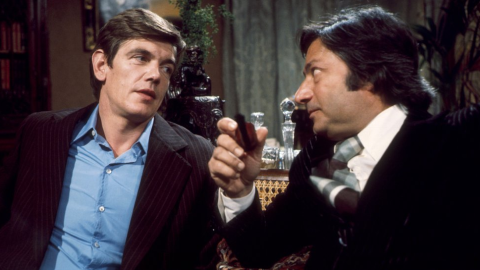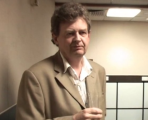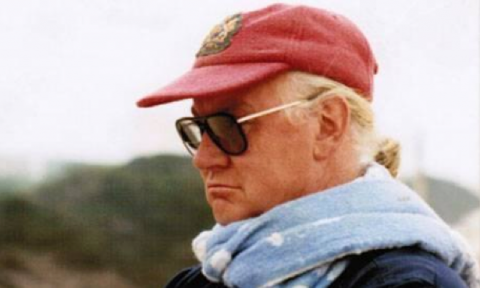From 22-24th April 2015 there was a conference at Royal Holloway College, part of the University of London, on Forgotten Drama. I was lucky enough to attend the conference, and there were several sessions which mentioned BBC Pebble Mill.
On the afternoon of the second day of the conference was a session on Second City Firsts, the anthology, half-hour drama series to come from BBC Pebble Mill in the 1970s. The series brief was to bring new talent to screen, often in the form of writers or directors fresh to television. Two plays were screened: The Actual Woman by Jack Shepherd, and Pig Bin by Brian Glover. A discussion followed the viewing, which included Jack Shepherd and director, Philip Saville, talking about The Actual Woman, and Tara Prem, who directed Pig Bin, along with Philip Jackson, who starred in it. Lez Cooke from Royal Holloway, chaired the discussion.
BBC English Regions Drama produced 74 half-hour plays from 1972-78, of which 53 were Second City Firsts. 14 half-hour plays were transmitted under the Thirty-Minute Theatre banner in 1972, followed by another six half-hour dramas which were transmitted without an anthology series title in Feb-March 1973. From October 1973 to May 1978 53 half-hour plays were transmitted under the series title ‘Second City Firsts’. There was one more half-hour drama, ‘Art … Adrift’ by Peter Terson, recorded in 1974, which was not transmitted.
Both The Actual Woman and Pig Bin were lost Second City Firsts, but Jack Shepherd had a Phillips 1500 cassette of the former, and Tara Prem a VHS of the latter. The archive society Kaleidoscope have now digitised and preserved these copies, which were used for the screenings.

The Actual Woman – features three characters, a husband and wife, and the husband’s brother. It is a psychological drama, where each character has the wrong idea about each other. None of the characters is very likeable, and the audience does not empathise with them. It is set in the Yorkshire countryside, with the married couple wrongly assuming that the brother lives in some rural idyll. It is a fairly dark tale, the husband and wife seem to hate each other, and there is an attempted rape of the wife, by the husband’s brother. The viewpoint shifts between the characters, with voice over presenting their thoughts during certain incidents in the drama.
Actor, Jack Shepherd, explained that he wrote the play as a live studio piece for the experimental arts magazine show: Full House. The show went out on BBC2 in 1972-3 from 9-11pm on a Saturday night, and included sketches, music, poetry and a live drama, in front of a studio audience. It was presented by Joe Melia. However, the play had to be re-envisaged as a location piece, after Full House was decommissioned in 1973. The voice over sections would have been soliloquies in the original studio production.
Philip Saville directed the piece and spoke about how the locations and bitter weather had really contributed to the atmosphere of the drama. It was also unusual as being an early experiment of shooting single camera on location, on tape, using a news type camera. Tony Raynor was the VT editor, and one of the few crew to get a credit.

Philip Jackson in Pig Bin
Pig Bin – was an extreme studio piece, set in one room, a police holding cell in the basement of a football stadium. Again, there are only three characters, an adult Leeds United fan, played by Philip Jackson, a young boy fan, and a police officer. The piece was a longer version of a short play written for Tara Prem by Brian Glover (her future husband) for her BBC studio directors course final project. Producer, Barry Hanson saw the recording from the course and suggested that it was expanded for a Second City First. The play relies on the quality of the acting, which is extremely good, and still stands up today. The Leeds accents of two football fans are quite strong, and there is great attention to detail.
This production was Tara’s first experience of directing, and she explained about the production process. Rehearsals would last for around a week, whilst the piece was choreographed. There was one day in the studio, with camera blocking taking most of the day, and the actual recording taking around two hours. Two or three cameras would have been used, but recording would not have been continuous. Studio days were very intensive, and overrunning was virtually unheard of, due to the expense of overtime. The play would have been recorded in chronological order. Philip Jackson described the ‘producer’s run’, which was a performance of the whole piece for the producer to see, and for the crew to wander round and work out how best to shoot it. A camera script, with the various cameras and shots on would be produced by the director. This was the bible, and although you could make changes on the recording day, it was extremely difficult if you did. Directing was challenging, as the action would all be happening on the studio floor, and the director would be up in the production gallery divorced from what was going on. Generally you had to talk to the actors through the floor manager; you could go down to the floor, if necessary, but it meant that things were serious if you did. The vision mixer would be cutting the play as the recording went on.

The panel were asked to explore the notion of the half hour play. Jack Shepherd said that he missed it, because the point of view of the writer is less present in modern dramas, but that single half hours are not profitable, and don’t sell abroad. Tara explained that the half hour format would never come back to TV, but that people who want to, will produce such pieces for online distribution, because that is now achievable on a very small budget, so anyone can have a voice, which is a positive thing. The actors’ perspective was also given – that there were now fewer opportunities to contribute to serious drama, whereas now you have to take what comes. Philip Saville said that television drama is now much more filmic, and less theatric. The result, almost certainly of more location and less studio recording.
You don’t see these kinds of dramas on television any more – and that, I think, is a shame. They tend to explore the human condition in a way in which few modern dramas do. They may seem slow and technically far poorer than contemporary dramas, but they have a powerful authorial voice which has been largely lost due to the commissioning process and demands of modern television.
(Thanks to Lez Cooke for supplying information about the number of half hour plays produced by ERD)







